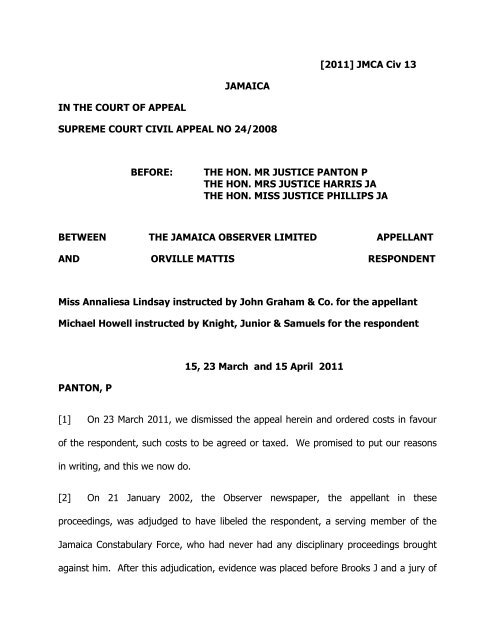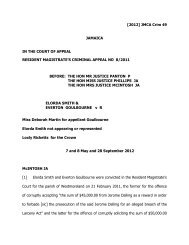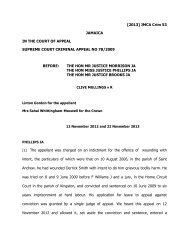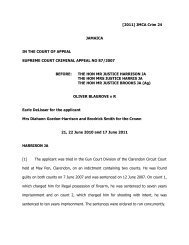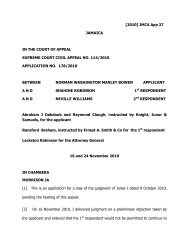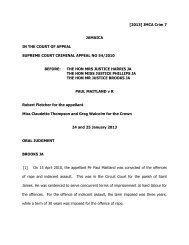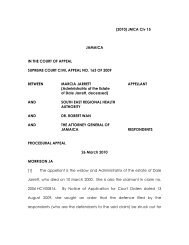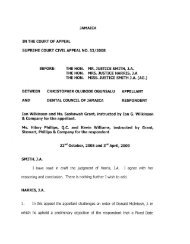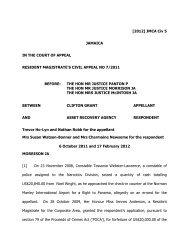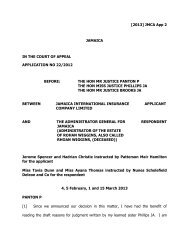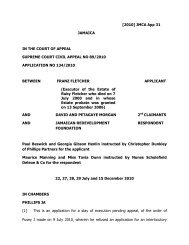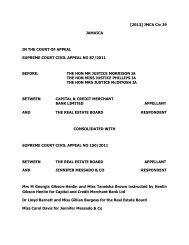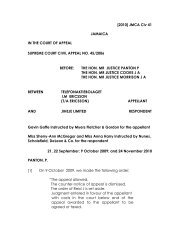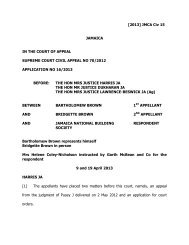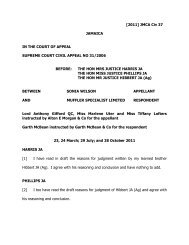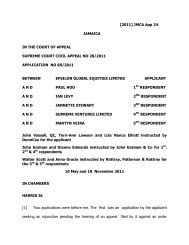Jamaica Observer Ltd. (The) v Mattis (Orville).pdf - The Court of Appeal
Jamaica Observer Ltd. (The) v Mattis (Orville).pdf - The Court of Appeal
Jamaica Observer Ltd. (The) v Mattis (Orville).pdf - The Court of Appeal
Create successful ePaper yourself
Turn your PDF publications into a flip-book with our unique Google optimized e-Paper software.
[2011] JMCA Civ 13<br />
JAMAICA<br />
IN THE COURT OF APPEAL<br />
SUPREME COURT CIVIL APPEAL NO 24/2008<br />
BEFORE:<br />
THE HON. MR JUSTICE PANTON P<br />
THE HON. MRS JUSTICE HARRIS JA<br />
THE HON. MISS JUSTICE PHILLIPS JA<br />
BETWEEN THE JAMAICA OBSERVER LIMITED APPELLANT<br />
AND ORVILLE MATTIS RESPONDENT<br />
Miss Annaliesa Lindsay instructed by John Graham & Co. for the appellant<br />
Michael Howell instructed by Knight, Junior & Samuels for the respondent<br />
PANTON, P<br />
15, 23 March and 15 April 2011<br />
[1] On 23 March 2011, we dismissed the appeal herein and ordered costs in favour<br />
<strong>of</strong> the respondent, such costs to be agreed or taxed. We promised to put our reasons<br />
in writing, and this we now do.<br />
[2] On 21 January 2002, the <strong>Observer</strong> newspaper, the appellant in these<br />
proceedings, was adjudged to have libeled the respondent, a serving member <strong>of</strong> the<br />
<strong>Jamaica</strong> Constabulary Force, who had never had any disciplinary proceedings brought<br />
against him. After this adjudication, evidence was placed before Brooks J and a jury <strong>of</strong>
eight for damages to be assessed. On 11 February 2008, damages were assessed in<br />
the sum <strong>of</strong> $1,000,000.00 with costs to the respondent to be taxed if not agreed.<br />
[3] <strong>The</strong> appellant, being apparently aggrieved by this award, challenged it on the<br />
basis that:<br />
(a)<br />
(b)<br />
(c)<br />
(d)<br />
it is excessive having regard to the evidence;<br />
the trial judge erred when he failed to<br />
withdraw from the jury the question <strong>of</strong><br />
whether the <strong>of</strong>ficer was entitled to damages;<br />
if damages were to be awarded, the amount<br />
should have been no more than $50,000.00;<br />
and<br />
the respondent admitted as true all the facts in<br />
the <strong>of</strong>fending article.<br />
[4] In order to put this appeal in its proper context, it is appropriate to quote the<br />
libelous article as reproduced in paragraph [3] <strong>of</strong> the statement <strong>of</strong> claim on page 6 <strong>of</strong><br />
the record:<br />
“3. On the front page <strong>of</strong> the Weekend <strong>Observer</strong> dated<br />
January 31, 1997 under the heading ‘SHAKE-UP<br />
AT SPECIAL ANTI CRIME TASK FORCE’, the<br />
Defendants falsely printed and published <strong>of</strong> the<br />
plaintiff and <strong>of</strong> him in the way <strong>of</strong> his occupation as<br />
a Constable <strong>of</strong> Police the following defamatory<br />
words:- ‘THREE OFFICERS ATTACHED TO THE<br />
SPECIAL ANTI CRIME TASK FORCE WERE<br />
RECENTLY TRANSFERRED AFTER IT WAS<br />
ALLEGED THAT THEY TOOK AWAY COCAINE<br />
FROM A MAN WITHOUT TURNING IT OVER TO<br />
THE NARCOTICS POLICE. THE THREE OFFICERS<br />
ARE DETECTIVE SERGEANT DODRICK HENRY
WHO WAS TRANSFERRED TO HANOVER;<br />
CONSTABLE O. A. MATTIS TO ST. ELIZABETH<br />
AND CONSTABLE A.H.BOBB WHO WAS SENT TO<br />
THE WESTMORELAND POLICE DIVISION,’ the said<br />
words were published to the world at large.”<br />
[5] <strong>The</strong> respondent gave evidence at the assessment and called two witnesses. He<br />
joined the <strong>Jamaica</strong> Constabulary Force in 1980, at age 18 years and at the time <strong>of</strong> the<br />
publication <strong>of</strong> the <strong>of</strong>fensive article, he was a constable. He was specially trained not<br />
only in the handling <strong>of</strong> dogs on narcotic missions, but also to work as an undercover<br />
agent. His duties involved watching for and reporting corrupt behavior <strong>of</strong> other police<br />
<strong>of</strong>ficers.<br />
[6] <strong>The</strong> publication <strong>of</strong> the libel left the respondent in shock and disbelief. He<br />
became ill two days after, and sought medical attention. He was on sick leave for<br />
about eight months thereafter. At the time, he was in a common law relationship. <strong>The</strong><br />
publication resulted, he said, in strange persons visiting their home, causing the lady to<br />
be “sick and tired <strong>of</strong> the situation”. She ended the relationship, migrated and married<br />
someone else. However, the respondent has since settled in another relationship. He<br />
claimed also that he lost a lot <strong>of</strong> his friends, and his family members became<br />
withdrawn. He himself became withdrawn as he was afraid to face people. He said that<br />
he met with resentment by <strong>of</strong>ficers in charge who did not wish to work with, or to talk<br />
to him as they would have done previously. Some <strong>of</strong> them even called him “druggist”.<br />
[7] <strong>The</strong> evidence revealed that since the publication <strong>of</strong> the libel, the respondent has<br />
been promoted twice, and at the time <strong>of</strong> the trial he was a sergeant. He maintains that
he would have been an inspector by now, looking towards being a deputy<br />
superintendent, had it not been for the libel. He no longer enjoys being in the police<br />
force, and is looking towards an early retirement.<br />
[8] While on sick leave, the respondent was apparently able to give some attention<br />
to the operation <strong>of</strong> a cable company in which he is a shareholder. That company grew<br />
during 1997.<br />
[9] <strong>The</strong> learned judge gave the usual directions on the law to the jury. He also<br />
reminded the jury <strong>of</strong> the evidence. In terms <strong>of</strong> their decision making, he said:<br />
“<strong>The</strong> ultimate question which you are asked to decide<br />
in this case is ‘what award <strong>of</strong> monetary compensation<br />
would be appropriate and necessary to compensate<br />
Sergeant <strong>Mattis</strong> and to re-establish his reputation’<br />
In deciding that question you have to answer for<br />
yourself two other questions.<br />
(1) To what extent has his reputation as a police<br />
<strong>of</strong>ficer and a community member been<br />
affected<br />
(2) To what extent has he personally been<br />
affected by the views <strong>of</strong> the police force and<br />
the community<br />
<strong>The</strong> evidence which was placed before you was from<br />
three witnesses.”<br />
[10] Miss Annaliesa Lindsay, for the appellant, submitted that the jury’s award was<br />
excessive considering the evidence that was presented. She pointed to what she said<br />
were deficiencies in the summation which may have led the jury into making the
excessive award. For example, she said, the learned judge did not highlight the fact<br />
that the allegations mentioned in the libelous article had been made prior to the<br />
publication and had been the subject <strong>of</strong> questioning <strong>of</strong> the respondent by one <strong>of</strong> his<br />
superior <strong>of</strong>ficers. <strong>The</strong>re was also the fact that the respondent had indeed been<br />
transferred. Miss Lindsay was very critical <strong>of</strong> the fact that no medical evidence had<br />
been adduced to confirm the respondent’s illness.<br />
In her view, the sum <strong>of</strong><br />
$1,000,000.00 would have been appropriate if there had been aggravating<br />
circumstances, or pro<strong>of</strong> <strong>of</strong> real damage to the respondent as a result <strong>of</strong> the publication.<br />
In the circumstances, an award <strong>of</strong> $300,000.00 would be more than adequate<br />
compensation.<br />
[11] Miss Lindsay took issue with the judge’s instruction as to the nature <strong>of</strong> the<br />
damages for their consideration. In her written submissions, she said this:<br />
“8.2 <strong>The</strong> learned Judge in his summation gave a<br />
detailed explanation <strong>of</strong> nominal as opposed<br />
to substantial damages. He then charged<br />
the jury that the award they make is to be<br />
moderate, without more. It is<br />
submitted that the use <strong>of</strong> the different<br />
terms, being nominal, substantial and<br />
moderate, may have led the jury into error.<br />
Such a direction by the learned Judge may<br />
have led the jury to believe that the<br />
Respondent was entitled to be<br />
compensated in more than nominal<br />
damages, which directly contradicted his<br />
earlier charge that it was for the jury to<br />
decide whether they would award nominal<br />
or substantial damages.”
[12] It should be mentioned that Miss Lindsay readily conceded that the sum <strong>of</strong><br />
$50,000.00 would be in the category <strong>of</strong> nominal damages, and as said, earlier she<br />
submitted that an award <strong>of</strong> $300,000.00 would have been fitting compensation for the<br />
respondent in the circumstances.<br />
[13] In response, Mr Michael Howell for the respondent said that the appellant’s<br />
submissions would have been more appropriate if a defence had been filed. He<br />
submitted that the respondent’s witness Linden Taylor had given evidence as to how<br />
sick the respondent was in 1997. Mr Howell said that the award was a moderate one,<br />
and that it reflected the fact that there had already been a discount to take care <strong>of</strong> all<br />
the reasons that had been advanced by the appellant. It was Mr Howell’s position that<br />
there was no good reason to interfere with the assessment that had been done by the<br />
jury.<br />
[14] At the commencement <strong>of</strong> the hearing before us, Miss Lindsay referred us to<br />
paragraph [38] <strong>of</strong> the judgment <strong>of</strong> the Privy Council in the case <strong>The</strong> Gleaner<br />
Company Limited and Stokes v Eric Anthony Abrahams [P.C. App. 86/2001<br />
delivered 14 July 2003]. <strong>The</strong> relevant portion <strong>of</strong> the paragraph reads thus:<br />
“<strong>The</strong> <strong>Jamaica</strong>n <strong>Court</strong> <strong>of</strong> <strong>Appeal</strong> does not have the<br />
power conferred upon the English <strong>Court</strong> <strong>of</strong> <strong>Appeal</strong> by<br />
section 8(2) <strong>of</strong> the <strong>Court</strong>s and Legal Services Act 1990<br />
and the Civil Procedure Rules to substitute an award <strong>of</strong><br />
damages for a sum awarded by the jury which it<br />
considers to be excessive. Except by consent, it can<br />
only order a new trial. In the present case, however,<br />
the parties had agreed that the <strong>Court</strong> <strong>of</strong> <strong>Appeal</strong> should<br />
be at liberty to substitute what they considered to be
an appropriate sum.<br />
award <strong>of</strong> J$35 million.”<br />
So the <strong>Court</strong> substituted an<br />
In that regard, Miss Lindsay indicated that she and Mr Howell had agreed that the court<br />
could substitute an award if it considered it appropriate.<br />
[15] It would be erroneous however, I feel, to interpret this part <strong>of</strong> the Privy Council’s<br />
judgment as saying that the <strong>Court</strong> <strong>of</strong> <strong>Appeal</strong> may only review a jury’s award if the<br />
parties consent. For a proper understanding <strong>of</strong> the position, one has to look at the<br />
judgment <strong>of</strong> the <strong>Court</strong> <strong>of</strong> <strong>Appeal</strong> in the said case delivered on 31 July 2000. At pages 29<br />
and 30 there<strong>of</strong>, Forte P referred to the judgment <strong>of</strong> the English <strong>Court</strong> <strong>of</strong> <strong>Appeal</strong> in<br />
Rantzen v Mirror Group Newspaper <strong>Ltd</strong> and Others [1994] QBD 670 wherein Neil<br />
LJ relied on the dicta <strong>of</strong> Lord G<strong>of</strong>f in Attorney-General v Guardian Newspaper <strong>Ltd</strong><br />
(No 2) [1990] 1 AC 109, 283-284. Neil LJ concluded that “the common law if properly<br />
understood requires the courts to subject large awards <strong>of</strong> damages to a more searching<br />
scrutiny than has been customary in the past. It follows that what has been regarded<br />
as the barrier against intervention should be lowered”. Forte P stated that this dicta<br />
seemed to have ended the restriction in the English <strong>Court</strong> <strong>of</strong> <strong>Appeal</strong> to interfere with<br />
excessive awards <strong>of</strong> juries only if they were so high that no sensible persons would<br />
have given such an award. He then unequivocally stated that he was in agreement with<br />
the approach adopted by the English <strong>Court</strong> <strong>of</strong> <strong>Appeal</strong>.<br />
[16] In the instant case, I am not convinced that the award <strong>of</strong> the jury is excessive. It<br />
has long been settled in this jurisdiction that the size <strong>of</strong> an award <strong>of</strong> damages may only<br />
be interfered with if it is either inordinately high or inordinately low. <strong>The</strong> jury in this
case would have been expected to bear in mind that the publication was to the effect<br />
that the respondent was being accused <strong>of</strong> having committed a very serious criminal<br />
<strong>of</strong>fence. Instead <strong>of</strong> detecting and apprehending <strong>of</strong>fenders, he was involved in<br />
wrongdoing that compromised his role as a police <strong>of</strong>ficer, according to the publication.<br />
<strong>The</strong> jury would have also borne in mind that the appellant, in the face <strong>of</strong> its apparent<br />
inability to defend the suit, had not <strong>of</strong>fered an apology to the respondent. Persons who<br />
publish libelous statements would do well to publish an appropriate apology in an<br />
equally prominent manner so soon as they become aware <strong>of</strong> their tortuous conduct.<br />
<strong>The</strong>y should not await the prompting <strong>of</strong> the injured party.<br />
[17] It takes years to build a good name and reputation. On the other hand, it takes<br />
only a few reckless lines in a newspaper to destroy or seriously damage that name or<br />
reputation. <strong>The</strong> damage usually remains for a good while. Section 22 <strong>of</strong> the c<br />
Constitution gives a right to free speech, but it does not permit defamation <strong>of</strong> one’s<br />
good character. When such damage has been proven, adequate compensation should<br />
follow. By no stretch <strong>of</strong> the imagination, can it be said that one million dollars<br />
($1,000,000.00) is excessive or inordinately high to compensate the respondent for the<br />
harm done to him.<br />
[18] <strong>The</strong> learned judge, in my view, dealt adequately with all the issues in this case in<br />
his summation to the jury. A judge is not expected in a summation to repeat every<br />
word <strong>of</strong> evidence. <strong>The</strong> important thing is whether there has been fairness in the giving<br />
<strong>of</strong> the instructions as to how the jury should approach their task. In the instant case,
the learned judge was thorough in his handling <strong>of</strong> the case, and the jury, in my view,<br />
gave an award which may be properly described as moderate.<br />
[19] For the foregoing reasons, I agreed with the dismissal <strong>of</strong> the appeal with costs to<br />
the respondent to be agreed or taxed.<br />
HARRIS JA<br />
[20] <strong>The</strong> respondent’s claim against the appellant was for the recovery <strong>of</strong> damages<br />
for libel.<br />
<strong>The</strong> facts giving rise to the appeal have been outlined by the learned<br />
president. It will not be necessary to repeat them.<br />
[21] Leave was obtained to argue the following amended grounds <strong>of</strong> appeal:<br />
“(a) With the consent <strong>of</strong> the Respondent, that the<br />
<strong>Court</strong> <strong>of</strong> <strong>Appeal</strong> be at liberty to substitute what<br />
they consider to be an appropriate sum being<br />
Three Hundred Thousand Dollars<br />
($300,000.00)<br />
(b)<br />
In the alternative that trial <strong>of</strong> the quantum<br />
<strong>of</strong> damages to be awarded be re-tried before<br />
a single judge <strong>of</strong> the Supreme <strong>Court</strong>.”<br />
<strong>The</strong> critical question is whether the award <strong>of</strong> $1,000,000.00 is inordinately high.<br />
[22] Miss Lindsay’s assault on the excessiveness <strong>of</strong> the award was, primarily, in<br />
relation to the extent <strong>of</strong> the damage which could have been caused to the respondent’s<br />
reputation, there being no aggravating circumstances or pro<strong>of</strong> <strong>of</strong> any damage done to
justify the award made.<br />
She argued that the respondent admitted that he was<br />
questioned by a superior <strong>of</strong>ficer about the allegations contained in the published article<br />
yet the learned trial judge failed to direct the jury’s attention to this aspect <strong>of</strong> the<br />
evidence. It was also her complaint that the learned judge gave detailed directions<br />
with respect to nominal as opposed to substantial damages, thereafter, he instructed<br />
them to make a moderate award.<br />
This she argued, may have led them into the<br />
erroneous belief that the respondent would have been entitled to a sum in excess <strong>of</strong><br />
nominal damages. His failure to fully distinguish <strong>The</strong> Gleaner Company Limited and<br />
Stokes v Abrahams P.C.A. No 86/2001 delivered 14 July 2003, may have also caused<br />
the jury to have made the excessive award, she argued.<br />
[23] A further attack was launched by her in respect <strong>of</strong> the evidentiary material<br />
which was before the court. Further, she contended, that although the respondent<br />
claimed that he proceeded on eight months sick leave immediately following the<br />
publication, no medical evidence was adduced to corroborate this assertion. Despite his<br />
reported illness, in 1997, she argued, he was the chief executive <strong>of</strong>ficer <strong>of</strong> a successful<br />
business co-owned by him, he was promoted twice since the time <strong>of</strong> the publication<br />
and notwithstanding that he declared that he became withdrawn, he had fathered three<br />
children subsequent to the publication. In these circumstances, she submitted, an<br />
award, not exceeding $300,000.00, would have been adequate to compensate the<br />
respondent.
[24] As a matter <strong>of</strong> law, an action for libel is actionable per se. Pro<strong>of</strong> <strong>of</strong> damage is<br />
not a requisite element <strong>of</strong> this tort. <strong>The</strong> violation <strong>of</strong> the claimant’s interest is enough to<br />
afford him a right to be compensated. <strong>The</strong> infringement <strong>of</strong> such right presumes a<br />
wrongful interference with his legal right giving rise to damages.<br />
Generally, the<br />
damages are at large - see Wheeler v Somerfield & Others [1966] 2 All ER 305.<br />
[25] <strong>The</strong> award made to the respondent is one for compensatory damages. <strong>The</strong><br />
purpose for such an award is threefold, to console him for personal distress and hurt,<br />
to provide reparation for the harm done to his reputation and vindication <strong>of</strong> his<br />
reputation - see Carson v John Fairfax & Sons <strong>Ltd</strong> [1993] 178 C.L.R 44. <strong>The</strong><br />
learned judge informed the jury as to the purport and intent <strong>of</strong> the award by specifically<br />
informing them <strong>of</strong> the foregoing.<br />
[26] In a claim for libel, a claimant is only required to put before the jury the<br />
impugned written words upon which he relies and it resides with them to decide the<br />
extent <strong>of</strong> the compensation to which the claimant is entitled - see English and<br />
Scottish Co-operative Properties v Odhams Press Limited [1940] K.B 440;<br />
Dingle v Associate Newspapers <strong>Ltd</strong> & Others [1961] 2 Q.B 162, C.A; [1964] AC<br />
371; H L Rookes v Barnard & Others [1964] A.C 1129.<br />
[27] <strong>The</strong> failure <strong>of</strong> the appellant to file a defence is an admission on its part that the<br />
publication was defamatory. Although the respondent is, per se, entitled to damages by<br />
virtue <strong>of</strong> the fact that injury may flow from defamatory words published, he is at liberty<br />
to bolster his case by showing that injury had in fact resulted. <strong>The</strong>re is evidence from
him and his witnesses in this regard. <strong>The</strong> question is whether the evidence adduced<br />
was sufficient to warrant the sum awarded.<br />
[28] <strong>The</strong> severity <strong>of</strong> the libel is a highly significant criterion in the making <strong>of</strong> an<br />
appropriate award for injury to one’s reputation. In John v MGN <strong>Ltd</strong> [1997] Q.B. 586<br />
at page 607, Sir Thomas Bingham MR said:<br />
“In assessing the appropriate damages for injury to<br />
reputation the most important factor is the gravity <strong>of</strong><br />
the libel; the more closely it touches the plaintiff’s<br />
personal integrity, pr<strong>of</strong>essional reputation, honour,<br />
courage, loyalty and the core attributes <strong>of</strong> his<br />
personality, the more serious it is likely to be.”<br />
In keeping with the foregoing tenets, the learned judge did not fail to instruct the jury<br />
as to the effect <strong>of</strong> defamatory words which are considered to be grave. In so doing, he<br />
informed them that:<br />
“Very serious defamations are those that go to the<br />
core attributes <strong>of</strong> the victim’s personality matters such<br />
as integrity, honour, courage, loyalty and<br />
achievement.”<br />
[29] In Sutcliffe v Pressdram <strong>Ltd</strong> [1991] 1 Q.B 153 C.A. and John v MGN, it was<br />
recommended that a trial judge should remind a jury <strong>of</strong> the purchasing power <strong>of</strong><br />
money. <strong>The</strong> learned judge informed the jury that they should take into account the<br />
purchasing power <strong>of</strong> their award. He said:<br />
“You would look at the value <strong>of</strong> the <strong>Jamaica</strong>n Dollar<br />
versus for instance the US$. Examine what sum<br />
would buy somebody a car or buy a vacation, a<br />
house, or what income a lump sum could produce if<br />
invested.”
[30] <strong>The</strong> current practice in England is that juries are told that they should have<br />
regard to comparable awards <strong>of</strong> general damages in personal injury cases in assessing<br />
an award for libel: John v MGN and Kiam v MGN <strong>Ltd</strong> [2002] 3 WLR 1036 (CA).<br />
However, there is some controversy as to whether a personal injury award for general<br />
damages should be used in the assessment <strong>of</strong> general damages for defamation. <strong>The</strong><br />
learned judge gave the jury no directions in this regard. I am <strong>of</strong> the opinion that it<br />
would not have aided them.<br />
For my part, I am <strong>of</strong> the view that no assistance could<br />
have been logically secured from referring to general damages in personal injury<br />
awards. As I see it, where the allegations are grave, in assessing general damages in<br />
an action for libel, the applicable test ought to be that which was propounded by Forte<br />
P, in Gleaner Company <strong>Ltd</strong> and Anor v Abrahams, which he put in this way:<br />
“Could a reasonable jury have thought that this award<br />
was one which was reasonable to compensate the<br />
plaintiff and to re-establish his reputation”<br />
[31] In <strong>The</strong> Gleaner Company <strong>Ltd</strong> and Anor v Abrahams, Lord H<strong>of</strong>fman,<br />
carried out an analytical and comparative review <strong>of</strong> a number <strong>of</strong> cases and issues<br />
arising in the award <strong>of</strong> general damages in personal injuries cases and general damages<br />
in defamation cases and in the process, noted certain distinctions between these<br />
damages.<br />
At paragraph [55], speaking to damages in an action for defamation,<br />
particularly to the sufficiency <strong>of</strong> damages, he said:<br />
“….. damages must be sufficient to demonstrate to<br />
the public that the plaintiff’s reputation has been<br />
vindicated. Particularly if the defendant has not<br />
apologized and withdrawn the defamatory allegations,<br />
the award must show that they have been publicly
proclaimed to have inflicted a serious injury. As Lord<br />
Hailsham <strong>of</strong> St Marylebone LC said in Broome v Cassel<br />
& Co <strong>Ltd</strong> [1972] AC 1027, 1071, the plaintiff “must be<br />
able to point to a sum awarded by a jury sufficient to<br />
convince a bystander <strong>of</strong> the baselessness <strong>of</strong> the<br />
charge”.”<br />
[32] In deciding this case, I am not unmindful that the role <strong>of</strong> an appellate court is a<br />
paramount consideration. This court is a court <strong>of</strong> review. Its function being one <strong>of</strong><br />
review, it ought not to embark upon a re-trial <strong>of</strong> a case. It is not within its province to<br />
say that if it were making an award it would have awarded a certain sum or that the<br />
approach <strong>of</strong> the jury should be on the same level as a trial judge in assessing damages.<br />
It is a settled rule that this court will not disturb an award <strong>of</strong> damages unless the<br />
amount awarded is inordinately high or very small so as to render it an erroneous<br />
estimate <strong>of</strong> the damage to which a claimant is entitled.<br />
[33] To set aside an award it must be shown that it was unreasonable and merits<br />
being disturbed. An award made by a jury could only be set aside if the award was<br />
unreasonable and no reasonable jury, properly directed, could have arrived at such an<br />
award - see Sutcliffe v Pressdram. <strong>The</strong> question therefore, is whether a reasonable<br />
jury could have considered the sum <strong>of</strong> $1,000,000.00 a reasonably necessary<br />
compensatory award for the respondent and to restore his reputation.<br />
[34] It is true that the learned judge had not brought to the jury’s attention that the<br />
respondent had admitted that he was questioned by his superior <strong>of</strong>ficer about the<br />
allegations contained in the article published by the appellant or that no medical
evidence was tendered substantiating his illness, but surely, they would have been<br />
aware <strong>of</strong> his admission as also the absence <strong>of</strong> medical evidence. <strong>The</strong> learned judge was<br />
not under a duty to carry out a microscopic recounting <strong>of</strong> the evidence so as to include<br />
all that had been adduced.<br />
[35] <strong>The</strong>re was evidence from the respondent that he became ill as a result <strong>of</strong> the<br />
publication which caused him to be absent from work for eight months; he having said he<br />
submitted medical certificates every two weeks. So far as the respondent’s business is<br />
concerned, contrary to Miss Lindsay’s submissions that it flourished in 1997, the evidence<br />
<strong>of</strong> Mr Taylor, the respondent’s business partner, shows, otherwise. He stated that in 1997<br />
there was no significant increase in the operation <strong>of</strong> the business and that in 1998, he, Mr<br />
Taylor, became the chief executive <strong>of</strong>ficer <strong>of</strong> the business. It was for the jury to have<br />
given such weight to the evidence as they deemed fit. <strong>The</strong> jury had seen and heard the<br />
witnesses. <strong>The</strong>y were pre-eminently the arbiters <strong>of</strong> the facts. It was for them to decide<br />
what facts they accepted or what facts they rejected. <strong>The</strong> failure <strong>of</strong> the learned judge to<br />
instruct the jury on these matters complained <strong>of</strong> by Miss Lindsay, would not be <strong>of</strong> such<br />
significance to have materially affected his directions to them so as to render their verdict in<br />
awarding $1,000,000.00 unsafe.<br />
[36] <strong>The</strong> learned judge informed the jury <strong>of</strong> the types <strong>of</strong> damages which could have<br />
been awarded. He said:<br />
“<strong>The</strong> amount you will award will depend on whether<br />
you decide nominal damages are in order or substantial<br />
damages are required.
If you decide nominal damages are in order you will<br />
award a sum which show,that you recognize that a<br />
wrong has been done but you are not satisfied on a<br />
balance <strong>of</strong> probabilities that Mr <strong>Mattis</strong>’ reputation has<br />
been greatly affected.<br />
On the other hand, in considering substantial damages<br />
you would consider what it is, the award that you<br />
make, could purchase, bearing in mind at al times you<br />
are awarding a figure which is necessary to provide him<br />
with adequate compensation and to re-establish his<br />
reputation.”<br />
[37] It is clear from the foregoing extract that the learned judge, having directed the jury<br />
on the classes <strong>of</strong> damages which could have been awarded, they would have bourne that<br />
in mind. I am not <strong>of</strong> the view that the jury, comprising eight intelligent persons (noting<br />
from their pr<strong>of</strong>essions) would not have appreciated the difference between nominal and<br />
substantial damages, nor would they not have understood what the learned judge meant,<br />
in informing them that the award should be moderate. <strong>The</strong> instructions to them to make a<br />
moderate award, undoubtedly, demonstrates that their award should not be very low nor<br />
inordinately high.<br />
In dealing with damages “… juries are not expected to make<br />
mathematical calculations, so they can only deal with this matter on broad lines” per Lord<br />
Reid in Lewis v Daily Telegraph <strong>Ltd</strong> [1964] A.C 234 at 262. Further, in referring to the<br />
Gleaner Company & Anor v Abrahams, which was cited by Mr. Kitchen for the<br />
respondent, the learned judge need not say more than he had. He drew their attention<br />
to the fact that Mr Abrahams was a former Minister <strong>of</strong> Government who was well known<br />
locally and internationally and that there were three publications in the newspapers<br />
attributing dishonesty on his part. He informed them <strong>of</strong> the effect which the articles
would have had on Mr Abrahams’ reputation, reminding them that they should be mindful<br />
<strong>of</strong> the evidence led in the case at bar.<br />
I am satisfied that the learned judge had<br />
satisfactorily guided the jury as to the law and material aspects <strong>of</strong> the evidence.<br />
[38] <strong>The</strong> allegations in the article amount to a criminal <strong>of</strong>fence and its publication is an<br />
imputation that the respondent had committed such an <strong>of</strong>fence. <strong>The</strong>re can be little doubt<br />
that the allegations are very serious and indeed the publication, having been made in<br />
popular national newspaper, would have caused severe damage to his reputation. It<br />
would have affected his rectitude, his pr<strong>of</strong>essional reputation, his honour and the “core<br />
attributes <strong>of</strong> his personality”. He was ridiculed by other policemen, who referred to him as<br />
“druggist”. Mr Taylor stated that after the publication the respondent “looked withdrawn<br />
and downtrodden” and had never been the same person he was as before.<br />
Inspector<br />
Brown stated that he became withdrawn. He lost his common law partner and some <strong>of</strong><br />
his friends and although promoted twice, he had a reasonable expectation that he would<br />
have been promoted to an Inspector but this did not materialize. Importantly, no apology<br />
had been tendered by the appellant. Additionally, there is nothing to show that he did not<br />
enjoy an unblemished reputation prior to the publication. It is reasonable to infer that the<br />
jury had taken into account all relevant considerations and had reasonably thought that an<br />
award <strong>of</strong> $1,000,000.00 was appropriate for the damage to the respondent's character<br />
caused by the appellant. In all the circumstances, it cannot be said that this award is<br />
disproportionate to the injury suffered by him.<br />
[39] I would dismiss the appeal with costs to the respondent to be agreed or taxed.
PHILLIPS, J A<br />
[40] This is an appeal from the judgment <strong>of</strong> Brooks J sitting with a panel <strong>of</strong> jurors<br />
whereby damages were assessed against the appellant in the sum <strong>of</strong> $1,000,000.00<br />
with costs limited to two days to be taxed if not agreed. <strong>The</strong> appellant challenged this<br />
award on the grounds that the sum in which damages were assessed by the jury was<br />
excessive having regard to the evidence; that the learned trial judge erred when he<br />
failed to withdraw from the jury the question <strong>of</strong> whether the respondent was entitled to<br />
damages; or alternatively that if damages were to be awarded then the judge should<br />
have directed the jury that damages <strong>of</strong> no more than $50,000.00 should have been<br />
awarded; and that all the facts in the <strong>of</strong>fending article were admitted by the respondent<br />
to be true in his evidence. <strong>The</strong> appellant therefore sought an order that the damages<br />
awarded be reduced to not more than $50,000.00. On 15 March 2011, we heard<br />
arguments on this appeal and on 23 rd March 2011, we dismissed it, affirmed the award<br />
and ordered costs to the respondent. <strong>The</strong>se are my reasons for concurring with that<br />
decision.<br />
[41] <strong>The</strong> respondent in this matter is a constable <strong>of</strong> the <strong>Jamaica</strong> Constabulary Force<br />
(JCF), and at all material times was attached to the Anti-Crime Task Force. <strong>The</strong><br />
appellant is the proprietor, printer and publisher <strong>of</strong> “<strong>The</strong> Week-end <strong>Observer</strong>”<br />
newspaper which has wide circulation throughout the island.
Background<br />
<strong>The</strong> pleadings<br />
[42] <strong>The</strong> respondent filed a claim on 31 August 2001 against the appellant claiming<br />
compensatory damages for the publication <strong>of</strong> an article on the front page <strong>of</strong> the<br />
Weekend <strong>Observer</strong> dated 31 January 1997 under the heading “Shake Up At Special Anti<br />
Crime Task<br />
Force”. <strong>The</strong> respondent pleaded that the following words falsely printed<br />
and published <strong>of</strong> him were defamatory in the way <strong>of</strong> his occupation as a constable <strong>of</strong><br />
police:<br />
“THREE OFFICERS ATTACHED TO THE SPECIAL ANTI CRIME<br />
TASK FORCE WERE RECENTLY TRANSFERRED AFTER IT<br />
WAS ALLEGED THAT THEY TOOK AWAY COCAINE FROM A<br />
MAN WITHOUT TURNING IT OVER TO THE NARCOTICS<br />
POLICE. THE THREE OFFICERS ARE DETECTIVE SERGEANT<br />
DODRICK HENRY WHO WAS TRANSFERRED TO HANOVER,<br />
CONSTABLE O.A MATTIS TO ST. ELIZABETH AND<br />
CONSTABLE A.H BOBB WHO WAS SENT TO THE<br />
WESTMORELAND POLICE DIVISION.”<br />
<strong>The</strong>se words, he stated, were published to the world at large, were referred to, and<br />
were understood to refer to him, as one <strong>of</strong> the police <strong>of</strong>ficers. <strong>The</strong> particulars <strong>of</strong> the<br />
libel are set out below:<br />
“A)<br />
<strong>The</strong> Plaintiff was a Constable <strong>of</strong> Police in the <strong>Jamaica</strong><br />
Constabulary Force and attached to the Special Anti<br />
Crime Task Force from the 16 th day <strong>of</strong> June, 1995 to<br />
5 th January, 1997.<br />
B) No other <strong>of</strong>ficer by the name <strong>of</strong> <strong>Orville</strong> <strong>Mattis</strong> was<br />
attached to the Special Anti-Crime Task Force<br />
between the 16 th day <strong>of</strong> June, 1995 to the 5 th day <strong>of</strong><br />
January, 1997 the time at which the publication<br />
referred to the Plaintiff’s transfer to St Elizabeth.”
[43] <strong>The</strong> respondent claimed that the said words in their natural and ordinary<br />
meaning meant or were reasonably understood to mean that he had committed<br />
criminal <strong>of</strong>fences contrary to the Corruption Prevention Act and the Dangerous Drugs<br />
Act.<br />
[44] <strong>The</strong> respondent claimed that by so doing the appellant was indicating that he<br />
was not a fit and proper person to be a member <strong>of</strong> the JCF. <strong>The</strong> respondent therefore<br />
claimed that by reason <strong>of</strong> the publication <strong>of</strong> the said defamatory words, he had been<br />
gravely injured in his character, credit and reputation as a police <strong>of</strong>ficer and had been<br />
brought into public scandal, odium and contempt.<br />
[45] An appearance was entered on behalf <strong>of</strong> the appellant on 14 September 2001.<br />
However no defence was filed within the time limited by the rules and judgment was<br />
entered in default there<strong>of</strong> on 21 January 2002. On 6 May 2005, an order was made by<br />
Dukharan J (as he then was) for the matter to be heard before a judge sitting with a<br />
panel <strong>of</strong> jurors. On 11 February 2008, the matter was heard and final judgment given<br />
on that day at the completion <strong>of</strong> the assessment.<br />
<strong>The</strong> assessment<br />
[46] At the hearing, three witnesses gave evidence for the respondent, while the<br />
appellant called no witnesses. Due to, as the learned judge put it, “the hybrid pre and<br />
post Civil Procedure Rule situation”, the court heard viva voce evidence in the absence<br />
<strong>of</strong> witness statements and allowed cross examination without any admission <strong>of</strong> liability<br />
or defence as to quantum, made or filed by the respondent.
[47] <strong>The</strong> respondent gave evidence that he had joined the force as a constable in<br />
1980 at 18 years old, and that it was his first and only job. He had been specially<br />
trained at the canine division in narcotic dog handling and, when Colonel McMillan was<br />
at the helm, he was given special training as an undercover agent. He gave evidence<br />
that he had been living with his common law spouse and young daughter at the time <strong>of</strong><br />
the publication, but that subsequent to the publication, unknown persons began visiting<br />
his home, forcing him into hiding and ultimately to remove his family from his home.<br />
Eventually, his common law spouse became ‘sick and tired’ <strong>of</strong> the situation and ended<br />
the relationship. He claimed too, that he not having been able to be around as a father<br />
figure to his daughter, “something sad happened to her”. <strong>The</strong> respondent maintained<br />
that he had not taken any cocaine from any man without turning it over. He had not<br />
been charged, but he had been asked about taking narcotics by Superintendent Daley<br />
<strong>of</strong> the Special Anti-Crime Task Force before the publication <strong>of</strong> the article.<br />
[48] He told the court that when he read the article he was, “shocked and in<br />
disbelief”. He said that he had lost a lot <strong>of</strong> friends and people accused him <strong>of</strong> being a<br />
“druggist”. His family were also in shock and disbelief and became withdrawn. Although<br />
he had been a regular attendant at his church, he went through a period <strong>of</strong><br />
absenteeism, due to people speaking to him on the subject. He became afraid to face<br />
people, so he stayed at home most <strong>of</strong> the time and then went on protracted sick leave<br />
for eight months. He said: “I was met with resentment by <strong>of</strong>ficers in charge. <strong>The</strong>y didn’t<br />
want to work with me or talk to me as they used to. I didn’t drink. Some <strong>of</strong> them called<br />
me druggist at times as a nickname. I didn’t take kindly to the name. I did not take any
other leave apart from sick leave”. In spite <strong>of</strong> all this, he said, he did not stop being a<br />
policeman.<br />
[49] <strong>The</strong> respondent testified further that before the publication, he would go out and<br />
play dominoes, go to the football field for exercise and go out with his family. But after<br />
the publication <strong>of</strong> the article, he seldom went out. He withdrew himself, “because <strong>of</strong><br />
what they were saying; what people would say”. He was very embarrassed and had<br />
experienced problems when travelling on four occasions to New York, Atlanta, London<br />
and Miami. He had been taken from the immigration lines, questioned about drug<br />
activities and strip searched. He said that because <strong>of</strong> the publication and the humiliation<br />
that he had experienced at the airports in the above states he had not travelled since<br />
2002, although, he did state that when he asked the immigration <strong>of</strong>ficers why he was<br />
being treated in that way he had been told that it was “routine”. In his view, he was no<br />
longer the person that he used to be before the publication, as he was now a “homely”<br />
and “withdrawn” person, whereas before he was “always bold and brave”. He said he<br />
always had more trust in himself knowing that people had trust in him, but things had<br />
changed and people now looked at him in a different light. He told the court that he<br />
had reported sick from the Sunday after the publication, and then thereafter, he had<br />
sent in sick certificates every 14 days for the period <strong>of</strong> eight months. He also stated<br />
that he had never received an apology from the appellants.<br />
[50] <strong>The</strong> respondent did tell the court, though, that he was at the time <strong>of</strong> trial living<br />
with a lady, and had been doing so for about five years (since 1997); that his mother<br />
had started going back to church, and more importantly, that he had been promoted to
the rank <strong>of</strong> corporal on 1 June 2000 and to the rank <strong>of</strong> sergeant, 1 February 2002.<br />
However, he was not enjoying his work as a police <strong>of</strong>ficer. <strong>The</strong> general state <strong>of</strong> the<br />
system and the “bad” things being said about police <strong>of</strong>ficers seemed to indicate to him<br />
that it was time to go. He had made enquiries about early retirement and discovered<br />
that he could do so at age 50 with 30 years in the service which would occur in two<br />
years. Had the publication not been made however, he said that he would have been<br />
“looking on now to Inspector and in another couple years Deputy Superintendent”. He<br />
indicated to the court that he had fathered six children in all, three since the<br />
publication. Only one <strong>of</strong> them lived with him. He accepted that in his work he could be<br />
transferred at any time without any reason being given for the reassignment, and that<br />
his job was a stressful one. He also recognized that his current position where he was<br />
stationed in Black River in St Elizabeth, was a supervisory one, and was a responsible<br />
position.<br />
[51] Inspector Louis Brown gave evidence that he was stationed in the same parish<br />
as the respondent, had joined the <strong>Jamaica</strong> Constabulary Force in 1975, and had thus<br />
been a member for over 33 years. He said that the respondent was a friend and<br />
colleague. When he read the article he “was really shocked and amazed”. Why<br />
Because he had worked on assignments with him and that was not the person that he<br />
had known and worked with. He had met him in 1982 or 1984, when he, Inspector<br />
Brown, was stationed at Central Police Station. He indicated that the respondent was<br />
held in high esteem by the team at “Central”, and because <strong>of</strong> that he was given<br />
undercover and covert work to do, which might not be dangerous work, but was highly
confidential work, and he was a trusted police <strong>of</strong>ficer. <strong>The</strong>y had faith in him. He said<br />
that they also used to socialize. Inspector Brown said that having read the article his<br />
view <strong>of</strong> the respondent had not changed, in fact, it may have strengthened with regard<br />
to whether he would have done any <strong>of</strong> the things alleged. But he said some <strong>of</strong> the<br />
colleagues in the JCF held his view, and others did not, as they felt that the appellant<br />
was a responsible newspaper, held in high regard, and would not publish information<br />
which could be so damaging without doing the proper research. But he accepted, and<br />
felt that his colleagues did too, that mistakes do occur. Inspector Brown indicated that<br />
the respondent had changed significantly since the article, he had become a totally<br />
different person. He was now withdrawn. <strong>The</strong> respondent had told him that he could<br />
not “face the world.” He said that the respondent’s name had come up in meetings as<br />
to why he had not been promoted. He maintained that the respondent was still a friend<br />
<strong>of</strong> his. He made however, the rather unusual statements that he could not confirm or<br />
deny whether there were any “Bad cops”; that a police <strong>of</strong>ficer who caused exhibits to<br />
be diverted, he would not call a bad cop; that he would call a police <strong>of</strong>ficer who takes<br />
an exhibit to a place other than where it was to go, a good cop!<br />
[52] Linden Antonio Taylor gave evidence that he was a businessman. He knew the<br />
respondent for several years as they had both attended Linstead All Age School. <strong>The</strong>y<br />
had been partners in a cable service company, Mattview Cable and Electronics Limited.<br />
Mr Taylor was the chief executive <strong>of</strong>ficer, and the respondent was the technical <strong>of</strong>ficer<br />
in charge <strong>of</strong> making decisions relating to extending the lines to customers in respect <strong>of</strong><br />
cables and amplifiers. He told the court about the difficulties that they had experienced
in funding the operation. He said that he saw the article the day that it came out and<br />
he was surprised, and subsequent to the publication, the respondent looked withdrawn<br />
and downtrodden, and was not his usual self, had never been the same, which<br />
remained so until the day that he gave evidence. He gave further details with regard to<br />
the company in which they were shareholders. He said that the respondent was the<br />
CEO in 1997 and then he (Taylor) became the CEO in 1998. He said that the company<br />
grew in 1997. <strong>The</strong>y both spearheaded that expansion. He knew that the respondent<br />
was on leave in 1997, but he said that he did not know the nature <strong>of</strong> his illness. He said<br />
quite clearly though, that he did not believe that the respondent was involved in any<br />
drugs. That was a view he held from in 1997 up until he was giving evidence, even<br />
though he knew that people were calling him “drug dealer”.<br />
[53] Counsel for the appellant said that the respondent had not been lowered in the<br />
eyes <strong>of</strong> right thinking members <strong>of</strong> the society. His witnesses had said that they had not<br />
been negatively affected by what they had read. <strong>The</strong> respondent, he said, was only<br />
entitled to a nominal sum in damages which he suggested should not exceed<br />
$50,000.00.<br />
<strong>The</strong> summation<br />
[54] In his summation the learned trial judge told the jury that the ultimate question<br />
which they were asked to decide was “what award <strong>of</strong> monetary compensation would be<br />
appropriate and necessary to compensate Sergeant <strong>Mattis</strong> and to re-establish his
eputation,” and that, in deciding that question they were to answer for themselves<br />
two other questions:<br />
“(1) To what extent has his reputation as a police <strong>of</strong>ficer and<br />
a community member been affected<br />
(2) To what extent has he personally been affected by the<br />
views <strong>of</strong> the police force and the community”<br />
[55] <strong>The</strong> learned judge accurately recounted the evidence to the jurors. He pointed<br />
out certain matters in respect <strong>of</strong> the evidence which he correctly left to the jury as<br />
issues <strong>of</strong> fact to be determined by them. For instance, was the respondent who<br />
fathered six, present in the lives <strong>of</strong> his children, although one lived with him while<br />
others would be adults by now; what course had his life taken since he has had three<br />
children and formed a live-in relationship since 1997, he could obviously still attract a<br />
mate. He informed the jury that it was not really relevant what effect the article had on<br />
members <strong>of</strong> his family as they had not been defamed. Additionally, although the<br />
fortunes <strong>of</strong> the business were also not relevant, nor the inability to obtain funding from<br />
the bank (the latter evidence did not show any connection to the case) he told the jury<br />
that they should consider whether the young business would have expanded, if the<br />
respondent had not shown up, and they should consider how the evidence in relation<br />
to the company may show the effect the article had in respect <strong>of</strong> this aspect <strong>of</strong> his life.<br />
<strong>The</strong> jury should also consider, when deciding how his pr<strong>of</strong>essional life was affected, the<br />
fact that he had been promoted twice since the publication <strong>of</strong> the article, yet he had<br />
stated that he wanted to retire from the JCF. <strong>The</strong> judge commented on the evidence
that the searches at the airport were said to be routine and could not therefore be<br />
attributed to the article. He stated also that they should consider the evidence given by<br />
the inspector when he described a policeman taking the exhibit to another place than<br />
where it should go as a good cop, in order to decide whether he was a candid witness,<br />
whose word one could rely on, or whether he was a patently biased person, (although<br />
the jury were reminded that one could accept some aspect <strong>of</strong> a witness’ evidence and<br />
reject other aspects).<br />
<strong>The</strong> judge directed the jury on the law <strong>of</strong> defamation and<br />
commented on the cases submitted.<br />
Finally, he told the jury that the award <strong>of</strong><br />
damages was to be moderate.<br />
<strong>The</strong> <strong>Appeal</strong><br />
<strong>The</strong> appellant’s submissions<br />
[56] On appeal, counsel for the appellant submitted that the appeal turned on a very<br />
narrow point, and that was that the sum awarded for damages was excessive. She<br />
abandoned the earlier submissions filed on behalf <strong>of</strong> the appellant suggesting a sum <strong>of</strong><br />
$50,000.00 as damages, and the ground that the judge had erred when he failed to<br />
withdraw from the jury, the question as to whether the respondent was entitled to<br />
damages. She brought to the attention <strong>of</strong> the court paragraph 38 <strong>of</strong> the Privy Council<br />
decision <strong>of</strong> <strong>The</strong> Gleaner Company Limited and Dudley Stokes v Eric Anthony<br />
Abrahams, Privy Council <strong>Appeal</strong> No. 86/2001 delivered 14 July 2003, to wit:<br />
“<strong>The</strong> <strong>Jamaica</strong>n <strong>Court</strong> <strong>of</strong> <strong>Appeal</strong> does not have the power<br />
conferred upon the English <strong>Court</strong> <strong>of</strong> <strong>Appeal</strong> by section 8(2)<br />
<strong>of</strong> the <strong>Court</strong>s and Legal Services Act 1990 and the Civil<br />
Procedure Rules to substitute an award <strong>of</strong> damages for a
sum awarded by the jury which it considers to be excessive.<br />
Except by consent it can only order a new trial.”<br />
After consultation with counsel for the respondent, the appellant applied to amend its<br />
notice and grounds <strong>of</strong> appeal so that the order sought was:<br />
“(a)<br />
(b)<br />
With the consent <strong>of</strong> the Respondent, that the <strong>Court</strong> <strong>of</strong><br />
<strong>Appeal</strong> be at liberty to substitute what they consider to be<br />
an appropriate sum, such appropriate sum being Three<br />
Hundred Thousand Dollars (J$300,000.00)<br />
In the alternative that trial <strong>of</strong> the quantum <strong>of</strong> damages to be<br />
awarded be re-tried before a single judge <strong>of</strong> the Supreme<br />
<strong>Court</strong>.”<br />
[57] Counsel for the appellant submitted in support <strong>of</strong> the claim that the damages<br />
awarded were inordinately high and that the learned trial judge did not mention certain<br />
aspects <strong>of</strong> the evidence to the jury in his summation namely:<br />
(ii)<br />
(i)<br />
(iii)<br />
that the allegations in the article had been made and the<br />
respondent had been questioned by a superior <strong>of</strong>ficer about<br />
them prior to the article having been published which could<br />
have affected the extent <strong>of</strong> the damage to his reputation;<br />
the learned judge indicated to the jury that the damages<br />
should be moderate when that decision should have been<br />
theirs, and his charge to whether the damages should have<br />
taken between substantial, moderate and nominal could have<br />
been confusing;<br />
he failed to outline in detail the distinctions between the<br />
instant case and the Abrahams case which could have led the<br />
jury into error in their award.
[58] <strong>The</strong> appellant also argued that there were other items <strong>of</strong> evidence which when<br />
considered in totality would lead to the conclusion that the damages awarded were<br />
excessive. <strong>The</strong>se were:<br />
(i)<br />
while the respondent was on sick leave his company<br />
flourished. It was reasonable to assume that during that<br />
period he took the time to “grow his private business”;<br />
(ii) there was no medical evidence to substantiate that the time<br />
he took away from work was connected to the publication;<br />
(iii) in spite <strong>of</strong> his evidence <strong>of</strong> becoming withdrawn and his then<br />
personal relationship coming to an end, he was able to<br />
father three children and to form a further relationship<br />
since 1997;<br />
(iv) prior to the publication, the respondent had been a<br />
constable in the <strong>Jamaica</strong> Constabulary Force for 17 years,<br />
yet since the publication he had been promoted twice; his<br />
earning capacity had clearly therefore not been affected. It<br />
was his said superiors in the organization who had<br />
questioned him who yet saw it fit to promote him; and<br />
(v) although the appellant had not submitted an apology, this<br />
must be considered in the light <strong>of</strong> the fact that they had<br />
not put forward a defence, and so had not attempted to<br />
delay the matter, and the respondent had agreed the<br />
content <strong>of</strong> the publication.<br />
<strong>The</strong> award, she submitted, was therefore excessive, and the court should award<br />
$300,000.00 in lieu there<strong>of</strong>.
<strong>The</strong> respondent’s submissions<br />
[59] In response, the respondent made the following points:<br />
(i)<br />
Although the respondent had been promoted twice the jury<br />
still had to consider that he no longer enjoyed his job and<br />
before the publication he had been looking forward to<br />
becoming an inspector and later a superintendent. Instead<br />
he was now looking for an early retirement.<br />
(ii)<br />
(iii)<br />
(iv)<br />
(v)<br />
Although the evidence was that there was success in the<br />
business it had not necessarily increased. Any success could<br />
have resulted from the efforts <strong>of</strong> Mr Taylor when he became<br />
CEO or from the efforts <strong>of</strong> the respondent before the<br />
publication <strong>of</strong> the article. <strong>The</strong>re was evidence to suggest<br />
that the respondent may not have contributed to the work <strong>of</strong><br />
the company in 1997. In any event both witnesses<br />
supported the respondent to say that he was sick and that<br />
would have to be accepted as there was no defence filed.<br />
<strong>The</strong> evidence was very clear from all the witnesses <strong>of</strong> the<br />
effect the article had on the respondent and that must be<br />
accepted. He had been outspoken and brave. He had<br />
become withdrawn and nothing like his former self. He had<br />
been separated from his daughter.<br />
<strong>The</strong> award was very modest in all the circumstances and all<br />
that had been argued on behalf <strong>of</strong> the appellant had already<br />
been taken into consideration by the jury. <strong>The</strong> award was<br />
not inordinately high, in fact it was inordinately low, and had<br />
already been seriously discounted.<br />
<strong>The</strong> court should be guided by the principles in Watt v<br />
Thomas [1947] AC, 484 Roy Green v Vivia Green (Privy<br />
Council <strong>Appeal</strong> No 4 <strong>of</strong> 2002) and Willis Reynolds v<br />
Derron Lewis SCCA 74/2001 (judgment delivered 7<br />
November 2002).
Analysis<br />
[60] Scrutton LJ in Youssouf v Metro- Goldwyn-Meyer (1934) 50 T.L.R. 584,<br />
gave the definition <strong>of</strong> a defamatory statement as “a false statement about a man to<br />
his discredit”. <strong>The</strong> learned trial judge told the jury that “the defamatory imputation<br />
has been defined in various ways but the most common definitions used are that it is<br />
an imputation which would (1) tend to lower the victim in the estimation <strong>of</strong> right<br />
thinking members <strong>of</strong> society generally, (2) cause others to shun or avoid the victim or<br />
(3) tend to expose the victim to hatred, contempt or ridicule”. I agree with this<br />
statement <strong>of</strong> the law. In this case the defamation is a libel as it is in written form. <strong>The</strong><br />
learned judge indicated that damages are presumed to flow from the wrongful act, and<br />
in keeping with the authorities he set out the three main functions that damages as<br />
compensation are supposed to achieve, with which I also agree viz:<br />
“a.<br />
to act as consolation to the victim for the<br />
distress he has suffered because <strong>of</strong> the wrongful<br />
statement;<br />
b. to repair the harm to his reputation, and<br />
c. as a vindication for his reputation<br />
Indeed, Forte P (as he then was) in Margaret Morris & <strong>The</strong> Gleaner Co. <strong>Ltd</strong> et al v<br />
Hugh Bonnick SCCA No 21/1998 delivered 14 April 2000 (unreported) in dealing with<br />
the question <strong>of</strong> damages, said at page 22:<br />
“In determining the quantum <strong>of</strong> damages to be awarded<br />
in a libel action such as this, the primary consideration<br />
must be the vindication <strong>of</strong> the plaintiff for the damage to<br />
his reputation which is man’s most cherished asset.<br />
Consequently, consideration as to how serious the libel is,
the degree <strong>of</strong> damages done to the plaintiff’s reputation,<br />
the magnitude <strong>of</strong> the publication, any genuine apology<br />
<strong>of</strong>fered including a declaration <strong>of</strong> the falsehood <strong>of</strong> the<br />
publication, and in some cases any injury to his mental<br />
health which is directly connected to the libel are some <strong>of</strong><br />
the factors to be taken into account, this <strong>of</strong> course not<br />
being an exhaustive list, as each case has to be considered<br />
on its own facts.”<br />
[61] <strong>The</strong> learned judge directed the jury to consider whether the libel was serious<br />
and therefore required substantial damages or not so serious and so nominal damages<br />
would suffice. He pointed out to the panel, quoting from the dictum <strong>of</strong> Sir Thomas<br />
Bingham, in John v MGN Limited, [1997] Q.B 593; 546 [1998] 2 All ER 35 that “Very<br />
serious defamations are those that go to the core attributes <strong>of</strong> the victim’s personality,<br />
matters such as integrity, honour, courage, loyalty, and achievement”. He ultimately<br />
directed the jury that the award was to be moderate. In my view this was correct.<br />
[62] <strong>The</strong> case <strong>of</strong> Abrahams had been submitted by the respondent, for comparative<br />
purposes, and the learned judge was careful to point out the differences in the factual<br />
situation between the two cases. He indicated that Mr Abrahams was a former Minister<br />
<strong>of</strong> Government, well known locally and internationally, and that he had been libeled in<br />
three notable newspapers, which libel had had a devastating effect on him personally<br />
and on his reputation.<br />
[63] Counsel for the appellant submitted that, in defamatory matters, each case<br />
turns on its own peculiar facts, and so precedents, save and except for the principles<br />
applicable to the assessment <strong>of</strong> damages, are in the main, <strong>of</strong> little assistance. I also
agree with this submission. Indeed, in the Abrahams case, Lord H<strong>of</strong>fmann referred to<br />
Forte P’s judgment in the <strong>Court</strong> <strong>of</strong> <strong>Appeal</strong>, in which he expressed the view that he was<br />
unwilling for juries to be addressed about first instance awards in other defamation<br />
cases, as the variables were too many “to be<br />
conducive to making worthwhile<br />
comparisons”.<br />
Forte P was also hesitant to adopt the English practice to allow<br />
reference to <strong>Court</strong> <strong>of</strong> <strong>Appeal</strong> awards, as these awards were made pursuant to the<br />
corpus <strong>of</strong> authority which has developed under the <strong>Court</strong>s and Legal Services Act, 1990,<br />
in the UK, (referred to in para [16]) which we do not have in <strong>Jamaica</strong>. Since 2003<br />
however, by and with the consent <strong>of</strong> the parties, some awards have been made by this<br />
court to substitute awards made by juries, but the number is still small.<br />
[64] In this case, as I have already indicated, pursuant to the consent <strong>of</strong> the parties,<br />
the court was invited to substitute such sum that it considered appropriate. In the<br />
Abrahams case Lord H<strong>of</strong>fmann under the heading <strong>of</strong> “<strong>The</strong> quest for uniformity and<br />
moderation” indicated that there are three ways to give the jury guidance on the<br />
amount to be awarded as damages in libel cases which he indicated<br />
have been<br />
canvassed in recent authorities.<br />
<strong>The</strong>se were (i) the purchasing power <strong>of</strong> money, (ii)<br />
the awards in other libel cases (which would be restricted in this jurisdiction as set out<br />
above), and (iii) general damages in personal injury cases. <strong>The</strong>re are serious difficulties<br />
which will be encountered in the use <strong>of</strong> all three, but in this case on appeal, suffice it<br />
to say none was submitted for consideration in support <strong>of</strong> the reduction <strong>of</strong> the award,<br />
and the burden <strong>of</strong> pro<strong>of</strong> would be with the appellant.
[65] <strong>The</strong> respondent relied on the judgment <strong>of</strong> Forte P in Willis Reynolds v Deron<br />
Lewis which is instructive. <strong>The</strong> court was there dealing with an appeal from an order<br />
made by Anderson J in an assessment <strong>of</strong> damages arising out <strong>of</strong> a claim in negligence,<br />
(thus not with a jury). <strong>The</strong> appeal only related to the award made for pain and suffering<br />
and loss <strong>of</strong> amenities. <strong>The</strong> learned president reiterated what he described as the<br />
general principle applied by this court before disturbing an award made by a trial judge.<br />
<strong>The</strong> principle he said was originally stated in Flint v Lovell [1934] All ER (Reprint) and<br />
subsequently applied in this court in several other cases: “<strong>The</strong> <strong>Court</strong> will not reverse an<br />
award <strong>of</strong> damages in respect <strong>of</strong> its quantum unless the <strong>Court</strong> is convinced either that<br />
the trial judge acted on some wrong principle <strong>of</strong> law or that the amount awarded is so<br />
inordinately high or so very small as to make the judgment <strong>of</strong> the <strong>Court</strong>, an entirely<br />
erroneous estimate <strong>of</strong> the damages to which the Plaintiff is entitled”. <strong>The</strong> analogy is<br />
readily drawn when the judge is sitting with a jury and this court is even more hesitant<br />
to interfere unless it can be shown that no reasonable tribunal when properly directed<br />
on the law and the evidence would have arrived at such a sum.<br />
[66] In Gatley on Libel and Slander (9 th edition at para 36.25 entitled Excessive or<br />
Inadequate Damages) the author said this:<br />
“Province <strong>of</strong> the jury. <strong>The</strong> jury is entrusted with the task<br />
<strong>of</strong> assessing damages and the appellate court is slow to<br />
interfere with an award on the ground that it is either too<br />
great or too small. <strong>The</strong> mere fact that the verdict is for a<br />
larger sum than the judges <strong>of</strong> the <strong>Court</strong> <strong>of</strong> <strong>Appeal</strong> would<br />
have given is not <strong>of</strong> itself a sufficient reason for upsetting<br />
the award. Similarly, the <strong>Court</strong> <strong>of</strong> <strong>Appeal</strong> is very reluctant to<br />
overturn an award on the ground <strong>of</strong> inadequacy <strong>of</strong> damages,
and will not do so merely because they think that ‘a more<br />
complete measure <strong>of</strong> justice would have been attained if the<br />
jury had given higher damages’. ‘It is not because a judge<br />
thinks that the jury would have done fuller justice by<br />
awarding higher damages that he is entitled to disturb their<br />
verdict, and order a new trial, when the action is entirely for<br />
the consideration <strong>of</strong> the jury acting as reasonable men’.”<br />
[67] In the instant case the learned judge gave a balanced summing up to the jury.<br />
He told them <strong>of</strong> their responsibilities as the sole judges <strong>of</strong> facts, to assess only the<br />
evidence before them without sympathy, to observe the demeanor <strong>of</strong> the witnesses,<br />
how to deal with inconsistencies and discrepancies and also the burden <strong>of</strong> pro<strong>of</strong> and<br />
what it means in civil cases. <strong>The</strong> summing up could not be faulted, in that regard. He<br />
certainly, in the main, drew to the attention <strong>of</strong> the jury the various issues mentioned by<br />
counsel for the appellant in para [58] above. It was a matter for them to decide based<br />
on the evidence as it unfolded. And in relation to the matters that counsel submitted<br />
that the trial judge did not specifically raise (see para [57] ), in my view, generally he<br />
had recounted the evidence accurately. I found that although he may not have<br />
emphasized to the jury that no medical evidence had been adduced, nor the fact that<br />
the appellant had not filed a defence and so had not attempted to delay the matter, he<br />
did give directions in relation to the award <strong>of</strong> substantial as opposed to nominal<br />
damages, and he did set out the similarities and differences between the facts <strong>of</strong> the<br />
Abrahams case and the instant case, sufficiently so that they could “decide how to<br />
position their award”. I found that the jury could not have been misled.
[68] This was a case in which the respondent was a police <strong>of</strong>ficer who before this<br />
article was proud <strong>of</strong> his occupation, and no doubt had a sterling reputation. He<br />
considered himself brave. He had the trust <strong>of</strong> his superiors. He was given covert work<br />
to do which required one to be highly confidential. He enjoyed being a part <strong>of</strong> the JCF<br />
and although he may not have been recognized for promotion before the publication,<br />
he obviously thought it was within his reach to obtain the status <strong>of</strong> inspector and<br />
deputy superintendent. <strong>The</strong> fact that he was promoted in spite <strong>of</strong> the cloud hanging<br />
over him can only be to his credit. <strong>The</strong> inspector who gave evidence on his behalf, and<br />
whom the jury probably believed, believed in him. <strong>The</strong> article affected him badly. It was<br />
an attack on his integrity in the police force. He was shunned or made to feel dishonest.<br />
He was afraid to face people. He even left his church for a while. He lost his common<br />
law wife and access to his daughter. Sad things happened to her. Even if he was able to<br />
attract a mate again and to have children too, he suffered for a period. Even if the<br />
company Mattview Cable and Electronics Limited had improved, as he was not so<br />
focused on his police work, that does not take away from the fact that he was<br />
uncomfortable at work with his peers, who called him “druggist” as a nickname, which<br />
he did not appreciate. <strong>The</strong>re is no doubt that he had obtained repeated sick leave<br />
certificates to be away from work, and his absence from work began immediately after<br />
the article was published. It was therefore a matter for the jury. <strong>The</strong> sum that the jury<br />
awarded for the damages for compensation for the injury to his reputation, in the<br />
circumstances <strong>of</strong> this case, appeared moderate and reasonable to me. I could see no<br />
reason to disturb the award <strong>of</strong> the jury. <strong>The</strong>re were no exceptional circumstances.
[69] I therefore was <strong>of</strong> the view that there was no merit in this appeal, and that it<br />
should be dismissed with costs to the respondent. <strong>The</strong> award <strong>of</strong> the jury was affirmed.


